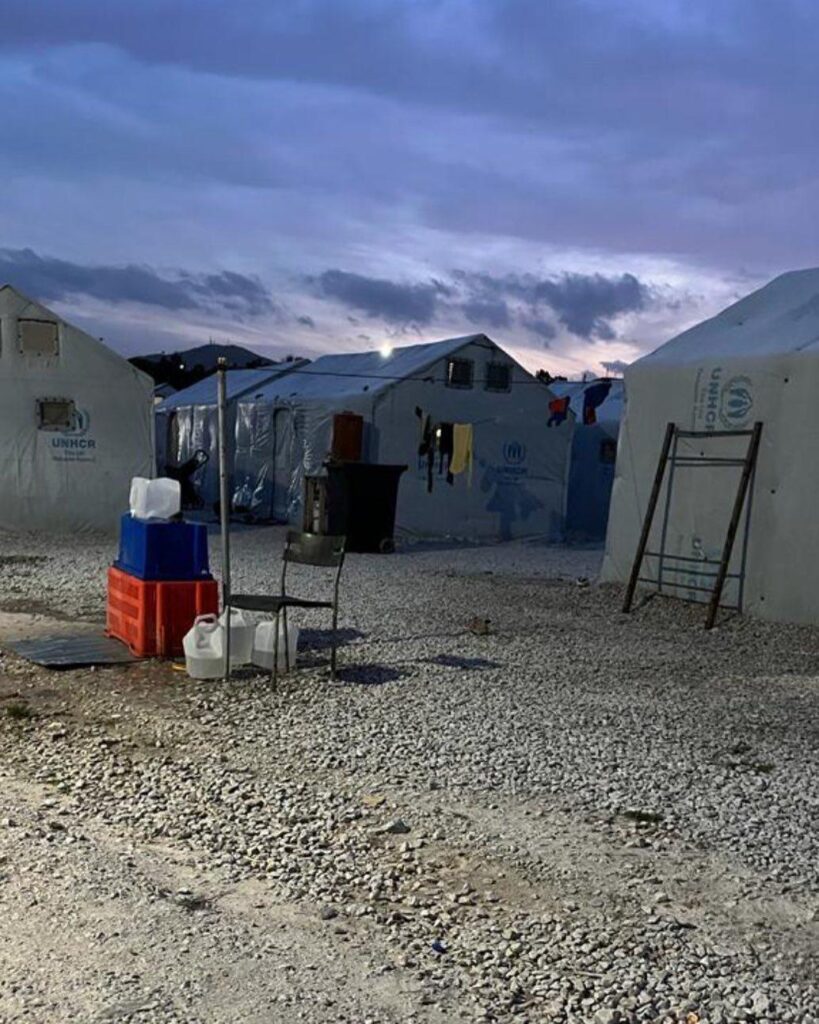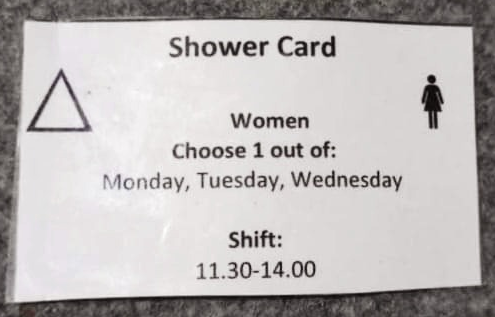What would have been a moment of joy for many people turned yet into another slap in the face.
 After waiting for over a year for an outcome on their asylum procedure, during the last months over 2000 people have received their positive decision. However, being recognized as a refugee doesn’t mean that you can leave the camp or the island immediately, since it can take several months for travel documents to be issued. However, the special task force is currently on Lesvos and is issuing documents in the hope of speeding up the process. Regardless, people still have to wait over a month in order to get their papers. On Tuesday 14 December, the camp’s policy suddenly changed once again.
After waiting for over a year for an outcome on their asylum procedure, during the last months over 2000 people have received their positive decision. However, being recognized as a refugee doesn’t mean that you can leave the camp or the island immediately, since it can take several months for travel documents to be issued. However, the special task force is currently on Lesvos and is issuing documents in the hope of speeding up the process. Regardless, people still have to wait over a month in order to get their papers. On Tuesday 14 December, the camp’s policy suddenly changed once again.
After several months of denying recognized refugees access to food and medical care, they are now also being denied access to shelter. In the following two days, over 700 people got kicked out of their iso-boxes or tents and forced to move into large rubhalls. A rubhall is a large tent without a floor and with large open doors that can’t be properly closed to protect against the wind. There is no electricity in any of these halls, and some of them do not even have mattresses (see video below posted by NowYouSeeMeMoria). Those “fortunate” enough to still be in the application process supposedly have access to support within the camp. This includes access to food, water, medical care and a roof over their heads.
Inside the camp, food is distributed once a day in tiny rations that are too small for a meal and often are already spoiled. With the increase in the population in the camp, it is no longer even possible to receive a daily portion of food as an asylum seeker. Every week, over 100 people end up empty-handed simply because they are the last ones in the queue. Only those who are in the application process can join the queue for food, those whose status has either been rejected or accepted have no access to these food lines. Although not allowed, they were able to cook a meal in their own tents with the limited food provided by NGOs outside the camp. In the rubhalls without electricity, this is now simply impossible.
 The current water and hygiene situation (WASH) in the camp is nothing short of a catastrophe. Although the camp provides drinking water, showers are rationed to once a week and no soap is provided. There is no hot water and most showers are out of order, so the showers that can still be used are terribly overcrowded. As there are no washing facilities in the camp, the residents also have no way of cleaning and drying their clothes.
The current water and hygiene situation (WASH) in the camp is nothing short of a catastrophe. Although the camp provides drinking water, showers are rationed to once a week and no soap is provided. There is no hot water and most showers are out of order, so the showers that can still be used are terribly overcrowded. As there are no washing facilities in the camp, the residents also have no way of cleaning and drying their clothes.
The shortcoming in sanitary conditions has taken its toll on the camp population leading to massive outbreaks of scabies, bed bugs and lice. These pests are currently considered an epidemic in the camp and pose a health hazard. Still, no measures are taken to combat these problems while most of these pests can be treated with simple remedies such as creams and shampoos. These are not being provided in the camp as they are not considered life-threatening. In addition to these physical health problems, the lack of food and sanitary facilities as well as the uncertainty of their asylum process and the overcrowded spaces of the camp have a negative impact on the mental well-being of the population, who are already scarred by bad experiences. Like shelter and food in the camp, medical care is only available to those who are in the application process, but not to those who have received a positive or negative decision.
The situation on Lesvos described here is not an isolated case. Other camps, such as the one in Samos, have comparable problems. As on Lesvos, there have also been major outbreaks of scabies, lice and bedbugs on Samos, which are epidemics and are not treated due to these pests not being considered life-threatening. Since 2022, water has become scarce inside the camp and for long periods of time, the water supply for the entire camp is limited to one hour per day, or there is no water at all. Due to the large number of new arrivals, the camp is overcrowded, till the point that several families have to share the space that is actually intended for a single family. In response, the camp on Samos is expanding its capacity with rubhalls, resembling those described above, which can hardly be called a shelter. One big difference with Lesvos, however, is the amount of information we can gather about the camp. This as a result of the camp on Samos being a closed facility, so the authorities can easily limit the amount of information available.
The camp in Samos is the prototype of the new CCAC’s the authorities want to implement all over Europe: camps in the middle of nowhere with high security systems, run like prisons. On Lesvos, the CCAC Vastria has been under construction for over two years with the last opening date given by the government being April 2024. While conditions in the current
camp are terrible, at least the information is still going out. We can only imagine the situation that people will face in Vastria during their asylum procedure. Vastria is located in the middle of a forest with a high risk of wildfires, more than 30 km from the city, over an hour away by car. A prison-like facility to keep the migrants even more out of sight of the so-called citizens and little chance for information to come out.
It’s not that the camps are not functioning properly, nor that there aren’t enough resources for the amount of people arriving. The structure of the camps has a purpose by itself: they are meant to be prisons.
The new European Migration Pact is based on detention. For now, people arriving on the islands are detained until they are registered, a process that can take over a month. Once they are registered, they can leave the camp but are forced to stay on the island. They can only leave once they receive their residence permit, a process that takes a few months at best. In Greece, Turkey is considered a third safe country, which means that many applications are rejected and people have to wait a long time for their asylum application to be considered by their country of origin instead. The new pact tightens and generalizes these measures. It requires that people crossing a border must be detained as close to the border
as possible and opens up the possibility to return people to third safe countries without even starting the asylum procedure. People will face quick border procedures that will easily end up in rejection of the application and detention until deportation, or until they accept to return to their countries voluntarily. The new pact is reinforcing the narratives that Europe has shaped over the last years. By using war-like words to refer to migration, they aim to get the silent acceptance of the population for all the new “migration management” policies. If we are “fighting against migration”, “defending our borders”, or “migration being a method of instrumentalization”, why would Europe try to actually provide shelter, food, health care, to all these people that are attacking us? Europe will simply not: camps are prisons because they are meant to be so.
pictures and videos shared by NowYouSeeMeMoria
